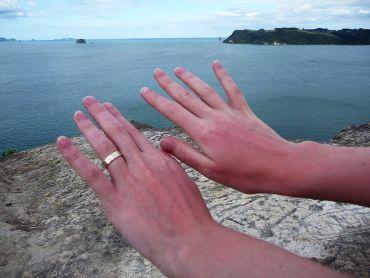
During the monsoon, with the heat subsiding we tend to forget a very crucial element of skin care. Sunscreen.
Sunscreen shields your skin from the UV rays of the sun. Even if it remains hidden behind the clouds or tangos with the rain, as long as it is daytime, your skin needs protection.
India being a tropical country, we need to be especially mindful of the harmful effects of the sun's ultraviolet radiation. While fairer skin is generally more susceptible to sunlight, dark-skinned people are not entirely immune to its ill effects. The harsh sunlight to which we are exposed can cause severe burns and skin damage if we are not careful. In the long term, it can lead to skin cancer.
Risks of overexposure to the sun- Sunburn: Exposure to sunlight increases production of a pigment called melanin as a form of protection. Over time, increased melanin levels lead to darkening of the skin, called a tan. When exposure exceeds the body's capacity to fight it with melanin, the result is a sunburn.
Sunburn is usually not felt immediately upon exposure. Typically, the skin develops painful and red patches or blisters in the affected area 6-48 hours after exposure. Severe sunburn can even cause fever, nausea and chills. The blisters eventually peel off, causing itching and the affected areas remain sensitive to sunlight for a while. - Photosensitivity: Some people are naturally photosensitive, meaning that they tend to get more sunburn upon relatively shorter exposure. Photosensitivity may be caused or aggravated by certain drugs like antibiotics or conditions such as porphyria and lupus. It is characterised by rashes and blisters and there may also be intense burning and itching.
- Wrinkles: Long exposure to sunlight ages the skin by hastening the formation of wrinkles and age spots. This happens because prolonged exposure to the sun damages fibres of the skin that help maintain its suppleness and allow it to bounce back after stretching. The skin loses its elasticity and sags, resulting in wrinkles. Sunlight also makes skin more prone to tears and bruises which don't heal easily.
- Pigmentation: Prolonged sunlight causes different types of pigmentation, ranging from small brown spots or freckles to patches of deep pigmentation around the nose and cheeks and yellow patches over the face.
- Tumours and cancer: Prolonged tanning can cause benign or non-cancerous tumours. It can also cause lesions that have a risk of turning cancerous. These are known as pre-cancerous lesions. Cancerous lesions lead to basal cell cancer, squamous cell cancer (which are the more common and treatable types of skin cancer) or melanoma (which is less common and more difficult to treat). In India, skin cancers range from 0.5 to 2 cases per 1,00,000 people -- which is a seemingly low 1-2 percent of the population. But given the country's huge population, this actually translates into a high numbers of cases.
How to prevent sunburn
- Avoid exposure to the sun between 10 am and 4 pm, hours when the sunlight is harshest.
- If you do need to step outdoors at these times, wear protective sunglasses and a wide-brimmed hat or carry an umbrella to protect your eyes, face and neck.
- Wear clothing that covers your arms and legs. Also avoid light or thin fabrics which can allow the sunlight to penetrate.
- Use sunscreen of an adequate Sun Protection Factor (SPF) value. For children and the darker skinned, an SPF of over 15 is usually suitable. For fairer people or pregnant women -- who are more severely affected by sunlight -- an SPF of 30 and above is advised, as they are more prone to the damaging effects of the sun. Remember to apply sunscreen at least 20 minutes before going out and reapply every two hours. This is also true of sunscreens that are water-resistant or specially formulated for swimming.
- The reflection of the sun's rays off surfaces such as water, sand or snow can increase their propensity to burn. So use suitable protection when you are on a beach or in the snow-capped mountains.
Home remedies for sunburn
- Prevent further sun exposure.
- Bathe with cold water and let it run over the affected areas.
- Apply a moisturiser or a cream containing aloe vera to the affected areas.
- Do not apply ointments containing local anaesthetics like lidocaine, petroleum jelly or butter as these delay healing and aggravate the condition.
- Use dry bandages over the blisters to prevent infection.
- Take a pain killer, such as ibuprofen or paracetamol as prescribed dosages for pain relief.
- If you experience severe dehydration, reduced urine output, fever, chills, nausea, dizziness, severe blisters or loss of consciousness after sunburn, contact your physician immediately.








